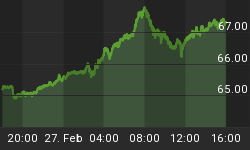FRA co-founder Gordon T. Long deliberates with Alasdair Macleod, head of research at GoldMoney on the Austrian School of Economics in an Era of Financial Repression.
Alasdair. Macleod began his career as a stockbroker in 1970 on the London Stock Exchange. Through experience he rapidly learned about things as diverse as mining shares and general economics, within nine years he had risen to become senior partner of his firm.
Subsequently, he has held positions at director level in investment management, as a mutual fund manager, and also at a bank in Guernsey as an executive director. For most of his 40 years in the finance industry, he has been de-mystifying macro-economic events for his investing clients. From the accumulation of his experience he concluded that unsound monetary policies are the most destructive weapon governments' use against people.
"I want to destroy this business of printing money as the solution to everything."
Mr. Macleod strives to educate and inform the public in layman's terms what governments do with money and how to protect themselves from the consequences.
What is Austrian Economics
"Prices are entirely subjective."
It began with Carl Menger who was one of the 3 economics who came up with marginal theory of prices. Where Menger differed from other two was that he appreciated that prices were purely subjective. You cannot forecast tomorrow's prices because prices are determined by the consumer who always has the option to buy.
"It overturns the cost theory of prices which is what Adam Smith believed in. It is completely irrelevant."
The law of the markets, the reason you and I work is we go out to earn something. We need to transform our skills into consumption. In a free market economy we have people who use their skills to earn money for consumption; the intermediary in this is money. Money is nothing more than the temporary storage of someone's labour that is transferrable into goods. If you understand this you will see how unsound money is bad for an economy. The idea by printing money which runs a budget deficit that a government can generate economic growth is nonsense.
"In regards to investing one thing that is desperately important to understand is that asset prices always refer back to their production."
This applies across every asset that you buy. If you see that the prices of assets have moved away from their underlining productive value then you know that you are in a bubble.
A World of Infinite Credit
"The world post 1970's is a completely different world from before the 1970s."
After 1981 rates had been lifted to a point which stopped the relationship between businesses and savers. This is what killed the price inflation up until the early 90s. Banks not only had the liberty to print credit but also to monopolize and control securities markets, if you combine these two thongs together; it is basically a money making machine, which is what we have today.
The end point in credit comes from the logical conclusion of that development. At every cyclical peak the level of interest rates which collapse the economy gets lower. The reason it gets lower is because this combination of credit control in securities markets does nothing more than just pumps up the level of debt. The overhang of debt means the rise in interest rates to stop the economy from getting out of control is getting lower. You cannot raise interest rates by more than one or two percent without serious economic dislocation.
Negative Nominal Interest Rates
"The effect of negative interest rates would be to throw every commodity into backwardation."
There is no doubt that negative interest would drive up inflation, or rather, it would lower the purchasing power of said currency. Negative interest rates for the reserve currency in which all commodities are priced have a severe risk which we will generate runaway inflation, but in fact it is a collapse. In order to make negative interest rates work you need to ban cash entirely. I have no doubt at all that that is the underlying reason why there is so much emphasis on anti-money laundering.
The FMQ Concept

"The fiat money quantity is the amount of money that would have to be redeemed for gold that once was deposited."
The fiat money quantity was put together to try to quantify the amount of money that Is being issued in return for the gold that we originally gave to our banks which the banks then handed to the federal reserve.
The reason for doing this is to try to get an idea of how much money is not only in public circulation, but also not in public circulation and potentially in public circulation. From looking at the Feds balance sheet and considering other factors like repos and reverse repos, we see that the growth curve has taken off; and in the very broadest sense we have monetary hyperinflation.
Abstract written by Karan Singh karan1.singh@ryerson.ca















